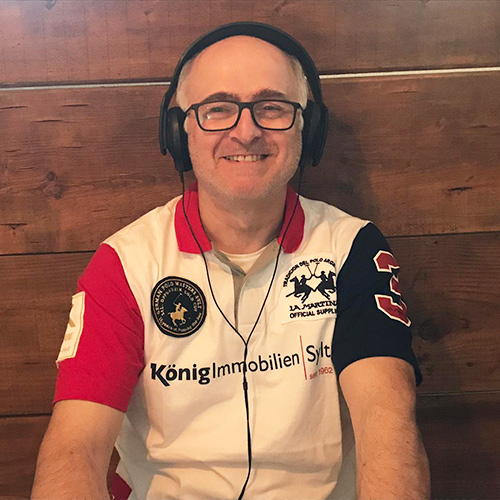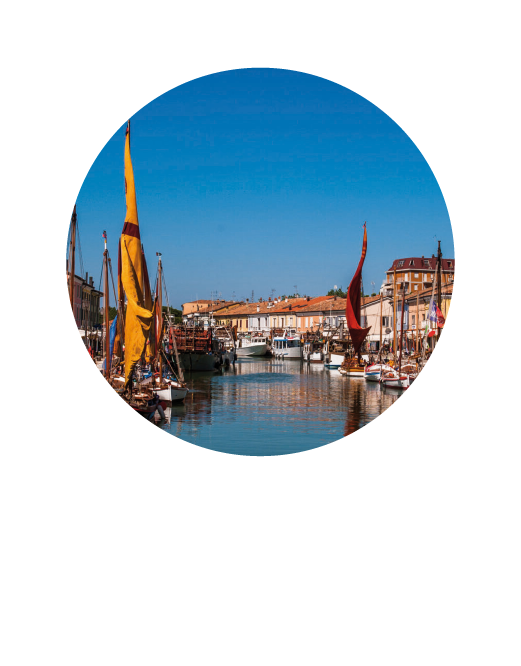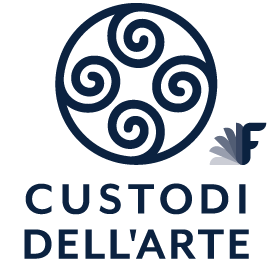

The Cat Bridge (The bridge on Viale Cecchini)
The Cat Bridge (The bridge on Viale Cecchini)
Riproduci traccia audio
Play audio track
Audio-Track abspielen
The Cat Bridge (The bridge on Viale Cecchini)
Trascrizione traccia audio
“Duv’andasì?”, “where are you going” asked my mother (in dialect) when she saw us going out together, me and my friend Marco.
I remember the days, as children, that the two of us lived secret lives. The reality was that it was only a secret life in our imagination, because everyone actually knew what we were doing.
In the winter, Marco and I left the Boschetto district, where we both lived. Just the two of us on the same bike, an old rusty Graziella, with its small 16” wheels. We would hide our fishing rods and head off near the Gambero Rosso restaurant on the East quayside, immediately opposite the fishing huts. There we would spend our time fishing for paganelli (a local fish) even though it was strictly forbidden.
However, in order to fish you need bait, and we had no money, we were just kids; so, on way we would go to the fish market where, in those days, they still had marble counters. The fishmongers would freely give us the intertwined tentacles of cuttlefish, which we in turn used as bait.
As soon as you cast your line in the water you are guaranteed to hook paganelli as this fish is attracted to any kind of bait you give it. From here we have a saying in our local dialect, “ci propio un paganel” which literally translated says “you really are a paganello” but, in reality it means you are very gullible, willing to take any bait thrown at you.
We would fill our tin buckets with water and pack them with our illicitly fished paganelli, until the bucket was full and then we would throw them all back into the sea. After all, we couldn’t take them home because then our secret would be out that we had been fishing. This was a great pastime.
In the afternoons, as the fishing boats returned from sea we would shout out to the sailors “Fish! Fish!”, and on hearing us, the sailors would throw us some of their catch, but even those couldn’t be taken home, so instead we would sell them for money!
When the long summer came, we would spend time on the beach and from there too, with permission from my dad and Marco’s mum, we would go on our trips. Once again, the two of us on the same bicycle and this time to the ladders situated on the quayside. Bringing a rope with us we would tie one end to the ladder and the other to the bicycle. The rope needed to be long enough to give us a good run with the bike. Once tied, we would pedal as fast as we could until we launched ourselves off the side of the quay, pulling up our legs as we sailed through the air, to make sure our feet didn’t get bogged down on the bottom of the canal as we landed in the water. Then we would climb out, retrieve the bike with a rope and do it all again. The winner was the one that managed to land furthest away from the quay. It was incredibly dangerous as fishing boats were coming into port as we were leaping in the water, but we loved it. The tourists would photograph us, however, when the police arrived, we would escape very quicky, soaked through and on occasions, to make sure we didn’t get caught, we would have to leave the bike in the water and retrieve it later.
Then, when I was little more than a kid, my life changed and, in those days, at the age of 14 we all started taking summer jobs. I worked as a waiter in the summer and in the winter attended a hotelier school in nearby Milano Marittima. I then moved on to be a cook, spending the winter seasons in the mountains: Cervinia, Montreux… A cooks life sees you moving around a lot and eventually I found a permanent position in Imola, 70kms away, and I settled there.
Every time I returned to Cesenatico, the first thing I would do was to come here, to the “Ponte Del Gatto”, the Cat Bridge. Whether it was 1am when I arrived in town, or at dawn the following morning I came to see the port.
The town was all mine at these times. I no longer came in company, I wanted to be alone, with my own personal thoughts, not those of someone else.
At Christmas time it was beautiful to come and find the spectacular floating and illuminated nativity scene.
The sea talks, the water has its own language, you must understand that, but you also must want to listen to it. It is difficult to tear yourself away from Cesenatico.
I returned to live here when I got married at the age of 36, returning to run my in-laws’ hotel.
So now, in the winter, I come to walk along the port when the fog rolls in from the sea. In Villamarina, where I live, I open the windows and from there I hear the sound of the foghorn, signalling the harbour entrance to the boats returning to port.
When you are with someone else you cannot navigate your mind and that is why I like to walk along the port on my own, with the damp air that penetrates my body and I feel like I’m in another world.
Audio Track transcription
“Duv’andasì?”, “where are you going” asked my mother (in dialect) when she saw us going out together, me and my friend Marco.
I remember the days, as children, that the two of us lived secret lives. The reality was that it was only a secret life in our imagination, because everyone actually knew what we were doing.
In the winter, Marco and I left the Boschetto district, where we both lived. Just the two of us on the same bike, an old rusty Graziella, with its small 16” wheels. We would hide our fishing rods and head off near the Gambero Rosso restaurant on the East quayside, immediately opposite the fishing huts. There we would spend our time fishing for paganelli (a local fish) even though it was strictly forbidden.
However, in order to fish you need bait, and we had no money, we were just kids; so, on way we would go to the fish market where, in those days, they still had marble counters. The fishmongers would freely give us the intertwined tentacles of cuttlefish, which we in turn used as bait.
As soon as you cast your line in the water you are guaranteed to hook paganelli as this fish is attracted to any kind of bait you give it. From here we have a saying in our local dialect, “ci propio un paganel” which literally translated says “you really are a paganello” but, in reality it means you are very gullible, willing to take any bait thrown at you.
We would fill our tin buckets with water and pack them with our illicitly fished paganelli, until the bucket was full and then we would throw them all back into the sea. After all, we couldn’t take them home because then our secret would be out that we had been fishing. This was a great pastime.
In the afternoons, as the fishing boats returned from sea we would shout out to the sailors “Fish! Fish!”, and on hearing us, the sailors would throw us some of their catch, but even those couldn’t be taken home, so instead we would sell them for money!
When the long summer came, we would spend time on the beach and from there too, with permission from my dad and Marco’s mum, we would go on our trips. Once again, the two of us on the same bicycle and this time to the ladders situated on the quayside. Bringing a rope with us we would tie one end to the ladder and the other to the bicycle. The rope needed to be long enough to give us a good run with the bike. Once tied, we would pedal as fast as we could until we launched ourselves off the side of the quay, pulling up our legs as we sailed through the air, to make sure our feet didn’t get bogged down on the bottom of the canal as we landed in the water. Then we would climb out, retrieve the bike with a rope and do it all again. The winner was the one that managed to land furthest away from the quay. It was incredibly dangerous as fishing boats were coming into port as we were leaping in the water, but we loved it. The tourists would photograph us, however, when the police arrived, we would escape very quicky, soaked through and on occasions, to make sure we didn’t get caught, we would have to leave the bike in the water and retrieve it later.
Then, when I was little more than a kid, my life changed and, in those days, at the age of 14 we all started taking summer jobs. I worked as a waiter in the summer and in the winter attended a hotelier school in nearby Milano Marittima. I then moved on to be a cook, spending the winter seasons in the mountains: Cervinia, Montreux… A cooks life sees you moving around a lot and eventually I found a permanent position in Imola, 70kms away, and I settled there.
Every time I returned to Cesenatico, the first thing I would do was to come here, to the “Ponte Del Gatto”, the Cat Bridge. Whether it was 1am when I arrived in town, or at dawn the following morning I came to see the port.
The town was all mine at these times. I no longer came in company, I wanted to be alone, with my own personal thoughts, not those of someone else.
At Christmas time it was beautiful to come and find the spectacular floating and illuminated nativity scene.
The sea talks, the water has its own language, you must understand that, but you also must want to listen to it. It is difficult to tear yourself away from Cesenatico.
I returned to live here when I got married at the age of 36, returning to run my in-laws’ hotel.
So now, in the winter, I come to walk along the port when the fog rolls in from the sea. In Villamarina, where I live, I open the windows and from there I hear the sound of the foghorn, signalling the harbour entrance to the boats returning to port.
When you are with someone else you cannot navigate your mind and that is why I like to walk along the port on my own, with the damp air that penetrates my body and I feel like I’m in another world.
Audiotrack-Text
“Duv’andasì?”, “where are you going” asked my mother (in dialect) when she saw us going out together, me and my friend Marco.
I remember the days, as children, that the two of us lived secret lives. The reality was that it was only a secret life in our imagination, because everyone actually knew what we were doing.
In the winter, Marco and I left the Boschetto district, where we both lived. Just the two of us on the same bike, an old rusty Graziella, with its small 16” wheels. We would hide our fishing rods and head off near the Gambero Rosso restaurant on the East quayside, immediately opposite the fishing huts. There we would spend our time fishing for paganelli (a local fish) even though it was strictly forbidden.
However, in order to fish you need bait, and we had no money, we were just kids; so, on way we would go to the fish market where, in those days, they still had marble counters. The fishmongers would freely give us the intertwined tentacles of cuttlefish, which we in turn used as bait.
As soon as you cast your line in the water you are guaranteed to hook paganelli as this fish is attracted to any kind of bait you give it. From here we have a saying in our local dialect, “ci propio un paganel” which literally translated says “you really are a paganello” but, in reality it means you are very gullible, willing to take any bait thrown at you.
We would fill our tin buckets with water and pack them with our illicitly fished paganelli, until the bucket was full and then we would throw them all back into the sea. After all, we couldn’t take them home because then our secret would be out that we had been fishing. This was a great pastime.
In the afternoons, as the fishing boats returned from sea we would shout out to the sailors “Fish! Fish!”, and on hearing us, the sailors would throw us some of their catch, but even those couldn’t be taken home, so instead we would sell them for money!
When the long summer came, we would spend time on the beach and from there too, with permission from my dad and Marco’s mum, we would go on our trips. Once again, the two of us on the same bicycle and this time to the ladders situated on the quayside. Bringing a rope with us we would tie one end to the ladder and the other to the bicycle. The rope needed to be long enough to give us a good run with the bike. Once tied, we would pedal as fast as we could until we launched ourselves off the side of the quay, pulling up our legs as we sailed through the air, to make sure our feet didn’t get bogged down on the bottom of the canal as we landed in the water. Then we would climb out, retrieve the bike with a rope and do it all again. The winner was the one that managed to land furthest away from the quay. It was incredibly dangerous as fishing boats were coming into port as we were leaping in the water, but we loved it. The tourists would photograph us, however, when the police arrived, we would escape very quicky, soaked through and on occasions, to make sure we didn’t get caught, we would have to leave the bike in the water and retrieve it later.
Then, when I was little more than a kid, my life changed and, in those days, at the age of 14 we all started taking summer jobs. I worked as a waiter in the summer and in the winter attended a hotelier school in nearby Milano Marittima. I then moved on to be a cook, spending the winter seasons in the mountains: Cervinia, Montreux… A cooks life sees you moving around a lot and eventually I found a permanent position in Imola, 70kms away, and I settled there.
Every time I returned to Cesenatico, the first thing I would do was to come here, to the “Ponte Del Gatto”, the Cat Bridge. Whether it was 1am when I arrived in town, or at dawn the following morning I came to see the port.
The town was all mine at these times. I no longer came in company, I wanted to be alone, with my own personal thoughts, not those of someone else.
At Christmas time it was beautiful to come and find the spectacular floating and illuminated nativity scene.
The sea talks, the water has its own language, you must understand that, but you also must want to listen to it. It is difficult to tear yourself away from Cesenatico.
I returned to live here when I got married at the age of 36, returning to run my in-laws’ hotel.
So now, in the winter, I come to walk along the port when the fog rolls in from the sea. In Villamarina, where I live, I open the windows and from there I hear the sound of the foghorn, signalling the harbour entrance to the boats returning to port.
When you are with someone else you cannot navigate your mind and that is why I like to walk along the port on my own, with the damp air that penetrates my body and I feel like I’m in another world.
Narrato da
Narrated by
Mehr Infos



